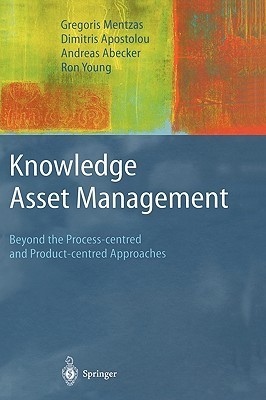

Knowledge Asset Management
Andreas Abecker, Gregoris Mentzas
2(1 readers)
There are two main approaches to knowledge management (KM), the process-centred approach which treats KM as an interpersonal communication process and the product-centred approach which focuses on the artefacts for knowledge, i.e. the documents, their creation and reuse in corporate computer-based systems. Knowledge Asset Management presents a knowledge asset-centric approach which fuses the previous two approaches together. It provides a conceptual framework to guide managers in the planning and development of the initiative and presents a methodology for organisations to: define and document their knowledge management strategy.- audit and design business processes that enhance and facilitate corporate learning.- facilitate knowledge sharing between people in the organisation.- measure and evaluate the quality and value of the organisation's intellectual capital. The book also introduces a way for developing an intranet-based environment to support: the collection and classification of internal and external information.- reuse of stored knowledge using flexible and customisable knowledge navigators and advanced search mechanisms including keyword and concept-based searching (e.g. visualization of the information space).- collaboration via on-line workspaces. Knowledge Asset Management gives an in-depth look at the technologies and methodologies required for knowledge management. Written by four highly experienced consultants in the field, the books also includes case studies showing how the principles work in practice. "One of the rare books today on Knowledge Management that addresses the leveraging of an organization's intellectual assets by using an integrative and holistic approach. Well worth reading!" Michael Stankosky, Professor of Knowledge Management and Co-founder/co-director of the Institute for Knowledge Management, The George Washington University "This book is a useful illustration of Knowledge Management implementation principles: it synthesizes theoretical and pragmatic approaches to the subject and does a competent job of embracing the various dimensions of a Knowledge Management initiative." Daniele Chauvel, Director, European Center for Knowledge Management; Business School Marseille-Provence "For those organisations who wish to take a strategic view of knowledge management, this book shows how they can take KM to the next level - not driven by a technology solution but based on the strategy and needs of the business." Marc Auckland, Chief Learning Officer and Head of the BT Academy, BT "The KM method proposed in this book enables enterprises to exploit their knowledge more effectively by making it easily available to employees and by facilitating the exchange and integration of information used by knowledge workers in a variety of business situations" Ciro Maddaloni, SOGEI S.p.A., Gruppo Telecom Italia.
Publisher
Springer
Publication Date
11/20/2002
ISBN
9781852335830
Pages
224
Categories
Reader Reviews
Loading comments...